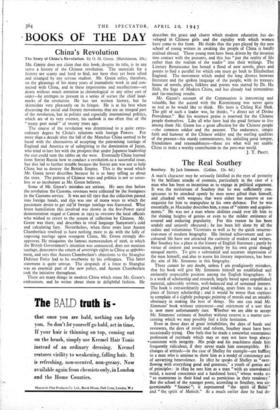BOOKS OF THE DAY
China's Revolution
MR. GREEN does not claim that this book, despite its title, is in any sense a history of the Chinese revolution. The materials for a history are scanty and hard to find, nor have they yet been sifted and arranged by any serious student. Mr. Green relies, therefore, on the gleanings of his many years of journalistic work in and con- nected with China, and in these impressions and recollections—set down without much attention to chronological or any other sort of order—he attempts to present in a series of scenes the chief land- marks of the revolution. He has not written history, but he skirmishes very pleasantly on its fringes. He is at his best when discussing the social and literary movements that are an integral part of the revolution, but in politics and especially international politics, which are of its very essence, his outlook is too often that of the " treaty port mind " of twenty years ago.
The course of the revolution was determined to a quite extra- ordinary degree by China's relations with foreign Powers. For more than a decade after the fall of the Manchus China seemed to be faced with the alternatives of accepting the patronising tutelage of England and America or of submitting to the domination of Japan, who tried to lure her with the prospect that under Japanese leadership the east could turn the tables on the west. Eventually China learned from Soviet Russia how to conduct a revolution.to a successful issue, but this led to further trouble because the Soviet aim was not to help China but to destroy the British Empire. This is the wood which Mr. Green never describes because he is so busy telling us about the trees. The pattern of Chinese wars and politics is not so sense- less or so incoherent as Mr. Green believes.
Some of Mr. Green's mistakes are serious. He says that before the revolution the Customs revenues were collected by the foreigners in the Customsservice. It was not till 1911 that the collection passed into foreign hands, and this was one of many ways in which the passionate desire to get rid'of foreign tutelage was frustrated. What bitter humiliation this involved was shown in the five-Power naval demonstration staged at Canton in 1923 to overawe the local officials who wished to revert to the system of collection by Chinese. Mr. Green was there, and describes in vivid language Sunyatsen's cold and calculating fury. Nevertheless, when three years later Austen Chamberlain resolved to have nothing more to do with the folly of imposing tutelage upon resurgent China, Mr. Green strongly dis- approves. He misquotes the famous memorandum of 1926, in which the British Government's intention was announced, does not mention tutelage, denounces the return of sovereign rights to China as appease- ment, and says that Austen Chamberlain's objections to the Shanghai Defence Force had to be overborne by his colleagues. This latter statement is quite untrue. The despatch of a force to Shanghai was an essential part of the new policy, and Austen Chamberlain took the initiative throughout.
There are many things in modern China which rouse Mr. Green's enthusiasm, and he writes about them in delightful fashion. He describes the grace and charm which modern education has -de- veloped- in Chinese girls and the rapidity with which women have come to the front. He thinks that the part played by the new school of young writers in awaking the people of China is hardly realised abroad. These young men have been driven by the invasion into contact with the peasants, and this has "put the reality of life rather than the realism of the studio " into their writings. The Literary Renaissance has loosed a flood of new novels, plays and poems to find a parallel for which one must go back to Elizabethan, England. The movement which ended the long divorce between literature and the spoken language of the people, with its treasure house of novels, plays folklore and poems was started by Dr. Hu Shih, the Sage of Modern China, and has already had tremendous and far-reaching results.
Mr. G;een's account of the Communists is interesting and valuable, but the accord with the Kuomintang was never quite so real as he would like to think. His hero is Chiang Kai Shek. The gift of such a leader was, he thinks, " a direct act of Divine Providence." But his warmest praise is reserved for the Chinese people themselves. Like all who have had the good fortune to live among them Mr. Green has a great affection for the Chinese people —the common soldier and the peasant. The endurance, simple faith and humour of the Chinese soldier and the sterling qualities of the peasant—his sturdy commonsense, his unfailing good temper, friendliness and reasonableness—these are what will yet enable China to make a worthy contribution to the post-war world.
J. T. PRATT.


























 Previous page
Previous page